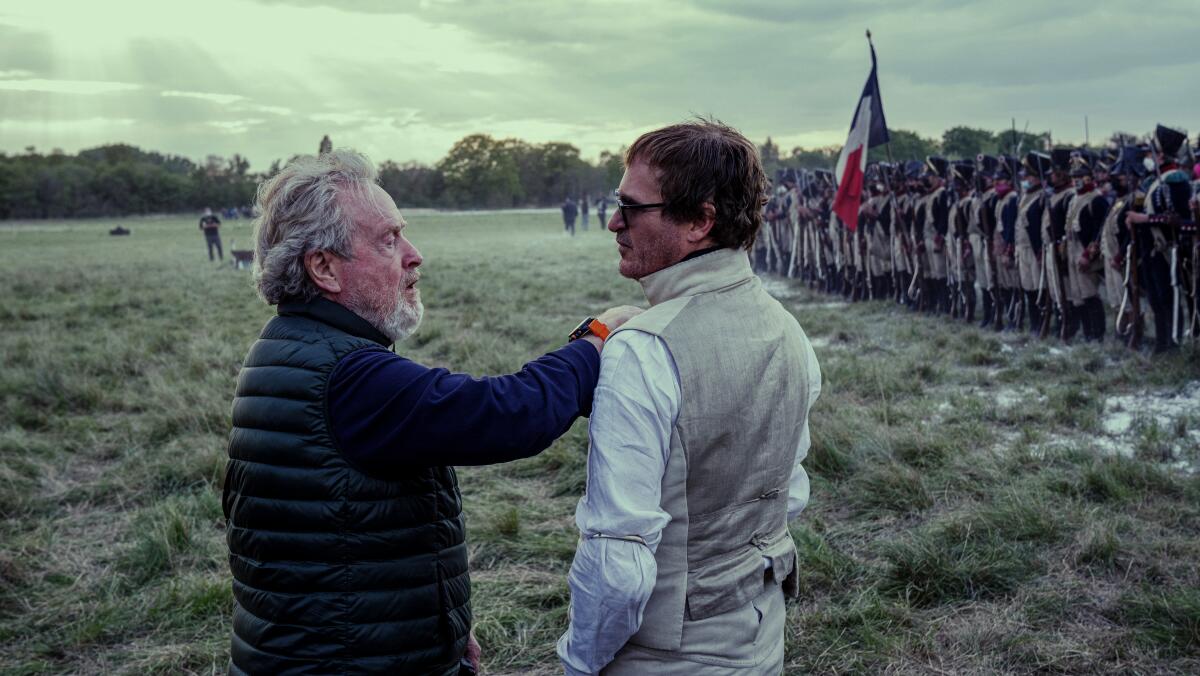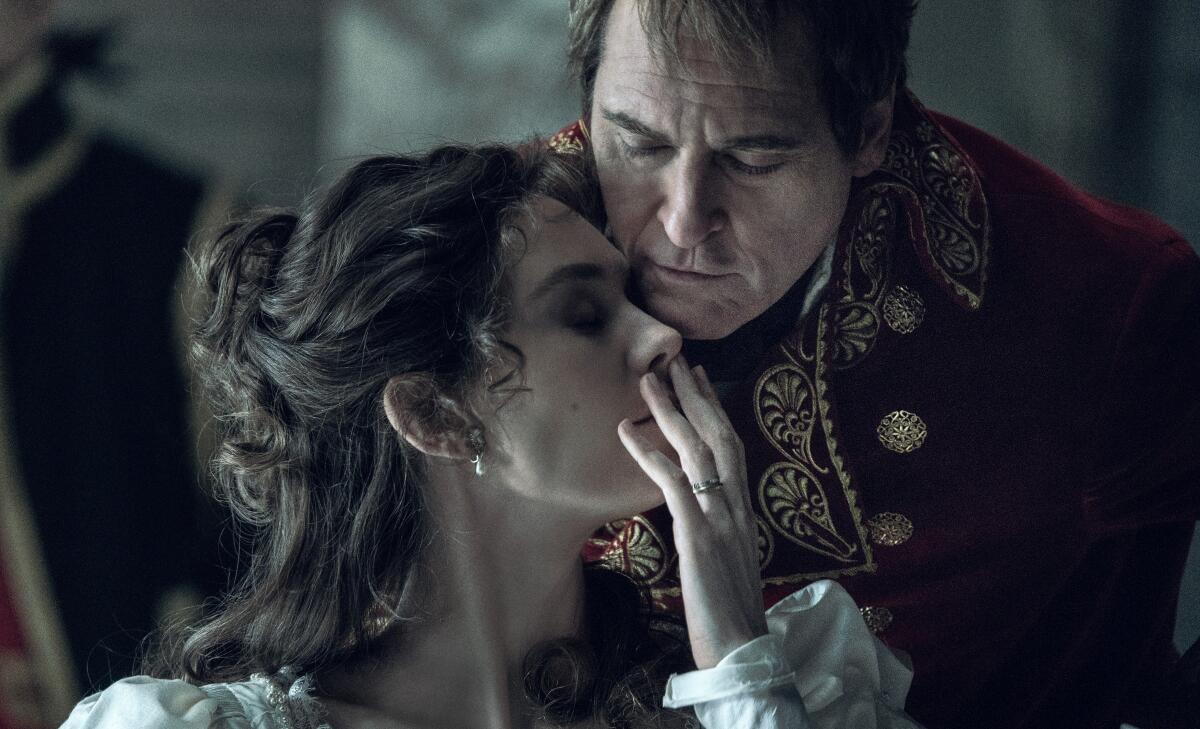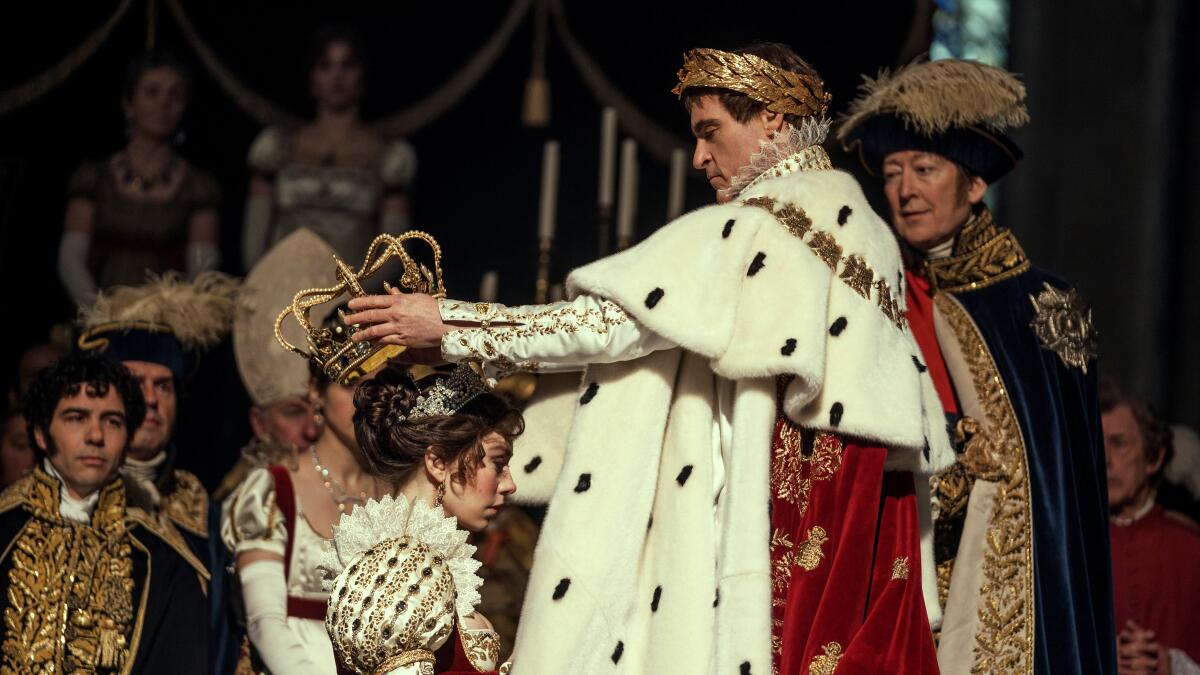Ridley Scott was intrigued by Napoleon’s inner life. And his Achilles’ heel -- Josephine

- Share via
Ridley Scott wasn’t a great student, although he isn’t going to shoulder all the blame. “The secret of teaching is that a teacher wants to do the job,” the erudite 86-year-old filmmaker declares over Zoom from his home in southern France, “and so often in my day, they did not want to do the job.” Even so, he found ways to survive his schooling. “I had two favorite subjects: I had art, of course, which is my first love, and then history. The history master was a great storyteller. I commented that I thought a lot of history books were just about the dates and the facts — why hadn’t they characterized them to make them more readable, like a good novel?” The teacher had a suggestion: “Why don’t you get the series of books on Captain Horatio Hornblower? It will keep you awake because the author wisely put a bit of sex into it.”
Hornblower was a fictional character, but author C.S. Forester set his stories during the Napoleonic Wars, firing the imagination of a young Scott. When he later made his first film, 1977’s “The Duellists,” he returned to those gripping, fraught early years of the 19th century: Napoleon Bonaparte wasn’t the movie’s central character, but he was never far from Scott’s thoughts.
“The image of Harvey Keitel standing on a clifftop, I took straight from the image of Napoleon Bonaparte from an engraving looking over France,” he recalls. “The war and the uniforms and the period and the horses, that always stayed with me.”
More than 45 years later, Scott may have finally worked the ambitious, fatally flawed French military leader out of his system. His sweeping new drama “Napoleon” stars Joaquin Phoenix, who plays Bonaparte as ruthless and awkward, painfully uncomfortable in the world except when he’s conquering parts of it with his army. This is far from a conventionally heroic biopic, featuring a sullen protagonist vainly seeking more and more power, as if it might possibly satiate the gnawing void inside himself. Long before Waterloo, though, he sealed his fate when he fell for Josephine (Vanessa Kirby), his faithless love who tormented him the rest of his days.
The grand canvas of “Napoleon” is familiar territory for Scott. But as in recent films ranging from “The Counselor” to “The Last Duel,” there’s an unmistakable new ambivalence to the proceedings, a creeping pessimism — or maybe it’s simply pragmatism — about the futility of so-called great men. That ambivalence is just as evident in “Napoleon’s” battle scenes, stunning set pieces that resist any attempt to be rousing. In effect, Scott has crafted a big-budget anti-epic, the pomp and circumstance — the dates and facts, you might say — never distracting from the literally and metaphorically small man at the story’s center. And taking a cue from Forester, there’s also a little sex.

“Battles get boring, action gets boring,” Scott suggests of his emphasis on unearthing Napoleon’s inner life. “I kept narrowing it down to ‘How can a man who is so significantly powerful and can do anything with fearless conviction have an Achilles’ heel?’ The Achilles’ heel was a woman. It can’t be just sex — that’s too simplistic. So that’s where we found the core — the relationship between him and Josephine. She didn’t feel the same [toward] him as he to her. That’s where we started.”
Napoleon has consistently fascinated filmmakers, for reasons that are obvious to Scott. “You have to take Napoleon on board as one of the major military players,” says Scott, putting him on par with “Alexander the Great, some Viking king, whatever. He was a major man who, like Marcus Aurelius, literally controlled Europe.” But those past cinematic explorations often resulted in heartbreak. Abel Gance’s 1927 silent movie, long hailed as a masterpiece, was recut and released at different lengths in subsequent years, his supposedly nine-hour original never seen again. After the success of “2001: A Space Odyssey,” Stanley Kubrick turned his attention to a film about Napoleon, only to be forced to abandon the project just ahead of production because of the commercial failure of the superficially similar “Waterloo.”
A great admirer of Kubrick, Scott was sent the late director’s materials for his aborted picture, which he found impressive but daunting. “His [script] was the entire encyclopedia of Napoleon from birth to death,” says Scott. “Incredibly well-researched, but that’s a five-hour movie. There’s just so long you can sit in a seat in a cinema, and 2 1/2 hours is about your limit,” which is the length of Scott’s “Napoleon.” He never got to talk to Kubrick about Napoleon — regrettably, the two auteurs never met, Scott only speaking to him on the phone twice. The first time was after “Alien” opened. Scott can still recall how the conversation started: “Hey there, it’s Stanley Kubrick here. How the hell did you get that thing to come out of his chest?”
The actor dubs the film’s central love story as an ‘unconventional, codependent romance for the ages.’
Scott tends to speak quickly, touching on an idea and then moving on, not given to flowery rumination or probing introspection. This is how he shoots too — fast and lean, to the point. “I learned speed and efficiency from commercial advertising, having my own company,” he notes. “If you pass into overtime, you pay and you can lose money. [Making films] I discovered I could shoot two, four, six, eight, 11 cameras [simultaneously]. My gift is as a visual person, so I can pre-imagine a scene before I get [on set] — I can drive in knowing exactly where I’d like to position my cameras.”
“Napoleon” serves as a reunion with Phoenix, who earned his first Oscar nomination on “Gladiator” playing the maniacal, insecure leader Commodus. Asked how much Phoenix has changed in the decades since they last worked together, Scott replies bluntly, “Not at all. He’s exactly the same person, driven by the same impulses. I can only be complimentary — he’s very smart, he thinks things to the point of obsession. If he’s going to do it, it becomes obsessive.”
It takes one to know one: “[I’m] manic-obsessive,” Scott adds. “It works out as a pretty good — I was going to say ‘friendship’ — partnership, working relationship, because he keeps me honest and I keep him looking good.” He chuckles, then elaborates. “I present pretty amazing backgrounds, and then he will be the pathway for his character. He says, ‘Do I have to say this much? Can I not say that?’ And so we endlessly go through that — he’s so intelligent, I have to concede.”
One might assume that he saw some of Commodus in Napoleon, both of them emotionally fragile warriors, but it was actually Phoenix’s Oscar-winning role as the Joker that convinced Scott he was right for the part. In interviews, Scott has criticized “Joker” for what he considered its glamorization of violence, a topic that’s been on his mind, especially considering that “Napoleon’s” war scenes are stripped of such allure. They demonstrate Napoleon’s tactical brilliance, but there’s purposely little that’s escapist about their somber execution.
“I think as a filmmaker today, particularly when I’m still flying high, you do become an influence — we have to be very careful about that,” he suggests. “I have a guilt about too much mindless violence.”
He’s never forgotten audiences at early screenings of “Alien” who were traumatized. “I couldn’t believe the reaction was so extreme. I felt uneasy about that. I remember being in St. Louis, we were previewing [the film] and I was standing at the back — the person to my right fainted. That bothered me. I’m trying to think of anything I’ve done where I’ve simply enjoyed the punch-up — not really. ‘Black Hawk Down’ was, I think, a righteous intervention in Mogadishu because it was genocide.”

At a time when there’s greater sensitivity around elevating stories about women, Scott has long focused on intelligent, nuanced female characters — his track record includes “Alien,” “Thelma & Louise” and “G.I. Jane.” And that’s to say nothing of his 21st century output, including “The Counselor” and “House of Gucci,” which are ostensibly stories about men in which the women have the upper hand. This tendency continues with “Napoleon”: The emperor takes Josephine as his bride, although she refuses to be possessed by him, sending him into constant despair, no matter his battlefield triumphs.
“I think it underscores the importance of women in our lives,” says Scott when this narrative pattern is brought to his attention. “My mother was really a tough guy, and she brought up three sons — one was called Tony Scott of ‘Top Gun,’ and then another one called Frank Scott, who was a sea captain in the South China Seas. He went from Singapore up to China, got strafed by MIG fighters. She was tough and strict, but gave us all a sense of enabling to do what you have to do. So we were all very, very strong.”
Scott isn’t inclined to discuss his films from a personal perspective though — talking about “Napoleon,” he speaks the language of logistics and problem-solving. Fittingly, if you ask him if he identifies with the old cliché that being a director is like preparing for combat, he readily agrees. “To bring together something that’s going to cost in excess of $200 million, you’re going to war. You’re going to put all the pieces together with a unit of 900 personnel — that means organization, pre-thinking. You run it like a government — I make my [department heads] talk to each other, fix the problem.”
But that doesn’t mean he doesn’t occasionally wear his heart on his sleeve — you just need to know where to look. “Napoleon” ends with a mysterious dedication to Lulu. Who’s Lulu? “Lulu is my darling little Border Terrier, who died,” he responds. “I was completely devastated. I love dogs. I adore dogs.” He smiles. “I’ve got a new one now called Josephine — yeah, Josephine. And she is a seducer. She is charming.”
Not that Scott is going to lose his composure as he thinks of his beloved late dogs. Like “Napoleon,” he is restrained, stoic, impeccably put-together. “There’s a good definition of sentimentality,” he offers at one point. “It’s unearned emotion.” He’s not wistful about getting older. He turned 86 about a week after “Napoleon” opened last month. His next film, “Gladiator 2,” with Paul Mescal and Denzel Washington, will be out a year later. “And I’m already [prepping] my next movie. The film is written already for next year. I used the downtime [on ‘Gladiator 2’] to say, ‘Let’s go.’” He is not slowing down.
When Ridley Scott directed “The Duellists,” he was already in his late 30s, realizing that if he continued concentrating on his lucrative career as a commercials director, he’d never get around to shooting a movie. “I had to sell my way around to get it going,” he admits. But “The Duellists” won the prize for best first feature at Cannes, and soon Scott was a filmmaker. He’s been thinking about that movie a lot because of its tangential connections to “Napoleon,” his cinematic beginnings now linked to his present.
“‘The Duellists’ was considered an art film at the time,” he says, amused. “To me, it was a western. There’s two gunfighters with sabers — people completely misconstrued it. So I learned about the idea of a commercial audience and an art audience — you’ve got to pre-decide what you’re going to do.”
So how does he view “Napoleon,” a pricey prestige drama that tweaks the conventions of the historical biopic, giving us a genius tactician who never could find peace — an iconic figure who’s portrayed as inherently weak? Is “Napoleon” commercial or is it art? As always, Scott is no-nonsense: “I cross my fingers and hope for the best.”
More to Read
Sign up for The Envelope
Get exclusive awards season news, in-depth interviews and columnist Glenn Whipp’s must-read analysis straight to your inbox.
You may occasionally receive promotional content from the Los Angeles Times.







